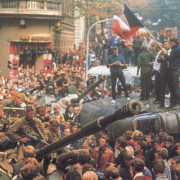On August 20, 1968, the Soviet Union led Warsaw Pact troops in an invasion of Czechoslovakia to crack down on reformist trends in Prague. The newly elected first secretary Alexander Dubcek appealed to the public to voice support for his proposed reforms: democratic elections, greater autonomy for Slovakia, freedom of speech and religion, the abolition of censorship, an end to restrictions on travel, and major industrial and agricultural reforms. Dubcek declared that he was offering “socialism with a human face.”
The Soviet Union and its satellites Poland and East Germany were alarmed by what appeared to be the imminent collapse of communism in Czechoslovakia.
Aug. 18: The Kremlin decides on the invasion of Czechoslovakia. The commander of Soviet Central Forces, General Aleksandr Mayorov, relates how Soviet Defense Minister Andrei Grechko stated to the assembled Soviet Politburo and military leaders: “the invasion will take place even if it leads to a third world war.”
Aug. 20: Czechoslovakia is invaded by an estimated 100,000 troops from the armies of five Warsaw pact countries (Soviet Union, Poland, Hungary, Bulgaria, and East Germany) overnight into Aug. 21.
Aug. 21, Shortly after 0100: State Radio announces invasion by troops from five Warsaw Pact countries. It says the invasion took place without the knowledge of the Czechoslovak authorities. “The Presidium calls upon all citizens of the Republic to keep the peace and not resist the advancing armies , because the defense of our borders is now impossible.” The army is given orders to remain in its barracks and not to offer resistance.
Aug. 21, 0300: Czechoslovak Premier Oldrich Cernik, Dubcek, Jozef Smrkovsky and Frantisek Kriegel — the four leading reformers in Czechoslovak leadership — are arrested in the Communist Party’s Presidium building by Soviet airborne troops.
Aug. 21, 0800: Crowds and Soviet troops confront one another on Old Town Square and Wenceslas Square. Tanks appear at the Museum and start firing at nearby buildings and the National museum. Dubcek and other party leaders are flown to Moscow and are compelled to participate in talks with Moscow leadership. They sign a document in which they renounce parts of the reform program and agree to the presence of Soviet troops in Czechoslovakia.
Aug. 23: Svoboda flies to Moscow with large delegation of Czechoslovak Communist leaders to negotiate a solution.
Aug. 25: Czechoslovak leaders sign so-called Moscow protocol which renounces parts of the reform program and agrees to the presence of Soviet troops in Czechoslovakia.
Aug. 27: Svoboda returns to Prague with Dubcek, Cernik.
Aug. 31: 14th Party Congress declared invalid, as required by the Moscow protocol. Censorship is reintroduced in the country.
Oct. 28: Czechoslovakia becomes a federal republic, the only major objective of the reform process that came to fruition.
Jan 16, 1969: Czechoslovak student Jan Palach sets himself afire in protest.
April 17, 1969: Dubcek removed as party first secretary, after disturbances that follow Czechoslovak hockey team’s victory over a Soviet team in Stockholm. Dubcek replaced by Gustav Husak with full support of the Soviet Union.
Author: red
Support Prague Morning!
We are proud to provide our readers from around the world with independent, and unbiased news for free.
Our dedicated team supports the local community, foreign residents and visitors of all nationalities through our website, social media and newsletter.
We appreciate that not everyone can afford to pay for our services but if you are able to, we ask you to support Prague Morning by making a contribution – no matter how small 🙂 .




